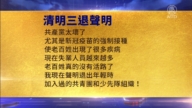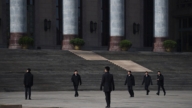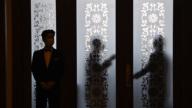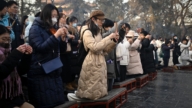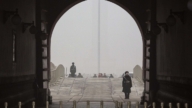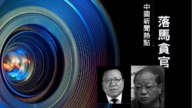【新唐人2012年11月09日訊】世界媒體都在高度關注中共十八大的召開,不同國家的媒體不約而同的都把焦點放在中共的改革上,而中國老百姓心裡,究竟對政治體制改革如何理解?
大陸官方媒體《環球時報》旗下的環球輿情調查中心,今年三月所作的民意調查顯示,超過8成的受訪者支持中國開展政改,不過,有超過7成的受訪者表示,對政治體制改革的內涵不清楚或不理解,只有28.2%的受訪者表示清楚政治體制改革的內涵。但他們理解的政改是甚麼,調查並沒有給予詢問。
《環球時報》旗下的環球輿情調查中心,在全國7個具有代表性的城市進行民意調查,在被問及應在哪些方面深化政治體制改革時,大多數受訪者認為是「各級政府進一步接受群眾和媒體的社會監督」,「反腐力度應進一步加強」,「政務信息更加公開、透明」,以及「政治決策過程應越來越民主科學」,《德國之聲》報導說,「儼然政改就是對政府施政的改良」。
《德國之聲》北京觀察欄目提出,中共領導層所謂的政改是:不能威脅一黨專政;而「中國式政改」或許只是「紙上談兵」。
旅美民運人士蔡桂華向《新唐人》表示,胡錦濤在十八大上提出七點改革的方向,但都隱含著一條具體的內容,就是:必須先確定他在黨內的地位,在他的理論框架下進行改革。
旅美民運人士蔡桂華:「至於說這七點真正要做到甚麼樣,真正要做到落到實處,我就覺得這些是漂亮的口號,漂亮的言辭。中國的一部憲法和一部法律,真正…裡面(規章)做到多少呢?可以說絕大部分 都做不到,完全都做不到,反過來說變成了一個絕對的權力,絕對的腐敗。」
蔡桂華說,在一黨專政的壟斷下談改革,都是空談。因為一黨操作的話,只是換湯不換藥,沒有多大改革的意義。
美國喬治梅森大學教授章天亮也表示,對於政治體制改革,官方的說法和民間不一樣。中共也講政改,但,實際上,在一黨專政、黨禁、報禁方面並沒有改革。章天亮說,中共當局所謂的政改,其實是一些行政手續方面的變化,並沒有觸及中國根本的問題。
章天亮:「如果開放黨禁、報禁、民間結社的話,那麼就會出現一個在選舉中打敗共產黨的團體,所以共產黨是絕對不會放棄的,對他們來說權利不僅僅是謀取好處,更重要的是保證他們自身安全,保證他們犯的罪惡不會被民眾所監督或者說審判。」
而蔡桂華還表示,中國真正的能夠走上民主的道路,必須建立多黨制、開放報禁、黨禁,讓民間的輿論有自由發揮的空間,讓輿論能夠起到監督的作用。
蔡桂華:「另外,民間社會有組黨的自由,有成立獨立工會的自由,成立民間組織的自由,確保這些自由的前提條件下我們再來談改革,是確實可行的,確實有效的,真正給老百姓許諾了要進行改革了。反過來說,這些都不存在的話,談改革都是是欺騙老百姓的一種幌子而已。」
《德國之聲》的報導引述香港城市大學政治學教授鄭宇碩的話指出:「新的領導層就算有意向去改革,也得有一些條件。第一,需要有一段時間去鞏固他的權力,需要在黨內建立共識,需要消化、打倒既得利益者的抗拒,所以要滿足這三個條件後才能說新的領導人有辦法、有魄力、有政治意志去推動政治改革。」
那麼,目前國際社會都在關注中共的所謂改革,十八大上產生的新一代領導人習近平,他有沒有這個膽量與魄力呢?全球目光已經聚焦在他的身上了。
採訪/朱智善 編輯/周平 後製/蕭宇
Political Reform Remains Difficult as CCP and Chinese Citizens have Different Understandings of its Meaning.
As the 18th National Congress draws great attention
from most global media,
the CCP’s political reform has become a hot topic.
On the other hand, what are the opinions of the Chinese
people themselves toward political reform?
The “Global Investigation Center on public opinions” which is
an affiliated agency of the CCP’s mouthpiece media Global Times, carried out a survey this March.
About 80% of people said they supported some kind of
political reform in China,
meanwhile over 70% of people also acknowledged that
they knew little about what political reform should include.
Only 28.2% said that they understood what
political reform really means.
However, the survey did not tell us what are the
understandings of that 28.2% of people.
An affiliated agency of Global Times,
the Global Investigation Center on public opinions,
once carried out a poll on public opinions of political reform
in 7 major Chinese cities.
When asked about what should be included in the reform,
most people answered that:
“Different levels of governments should
be subject to public supervision”,
“Anti-corruption needs to be strengthened”, “Information on
political affairs should be more open to the public”,
and “More democracy should be introduced into the decision
making procedure in China’s politics”.
The Deutsche Welle remarked that, “Obviously, the Chinese
believe that political reform is equivalent to reform of CCP governmental policy”.
Deutsche Welle’s “Observation of Beijing” channel also
remarked that, in the CCP leaders’ opinion,
“political reform” cannot be allowed to threaten
their one party dictatorship;
therefore the CCP’s political reform will probably only
end with empty talk.
Chinese democrat Cai Guihua told NTD that,
there is an implicit prerequisite behind all the seven points
mentioned by Hu Jintao in the 18th National Congress.
That is, his leading role inside the party has to be established
and the reform can only be carried out under the instructions to be found in his theoretical framework.
(Cai Guihua): ”Talking about what real changes
Hu’s “seven points” will bring to China, I personally regard them as pleasant but empty talk.
Just think of this, how much of the CCP’s constitution and
it’s laws have been really implemented?
It’s safe to say the vast majority of them are being
violated on a regular basis in China.
So on the other hand, we only see absolute power
which leads to absolute corruption.”
Cai remarked that, any political reform subject to one-party
dictatorship regime can only be empty talk because
it won’t bring real changes this of course will mean very little
to the Chinese people themselves.
Professor at George Mason University, Zhang Tianliang
pointed out that,
the CCP authority has different understandings of the term
“political reform” from those of the Chinese people.
In fact, the CCP’s political reform does not touch one-party
dictatorship, ban on political parties and ban on the press.
Zhang Tianliang remarked that, the CCP』s political reform
only includes some changes of administrative procedures,
which does not touch the fundamental problem
of China’s politics.
(Zhang Tianliang): ”If the bans on political parties,
the press and civil political groups were lifted,
some of them might stand up and
defeat the CCP’s organizations in the elections.
Therefore the CCP will never do that. To the CCP members,
their power is not only a resource of profits,
but also ensures their life safety so that their crimes
won’t be known by the public or brought to justice.”
Cai Guihua believes that, a multi-party framework has to
be established as a real democratic regime in China.
In addition, the ban on the press and political parties must
be lifted and more space has to be given
to non-official media to ensure the efficiency of
their role of social supervision.
(Cai Guihua):”Furthermore, citizens should have
freedom and the right to build political parties, unions and civil organizations.
Any political reform is only real and doable and
can benefit the Chinese people when those rights are under absolute protection.
On the contrary, any reform can only be deceptive without
those changes taking place.”
A recent Deutsche Welle report cited words from Zheng
Yushuo, a politics professor from City University of Hong Kong:”
Even if the new CCP leader group has the will to push
the reform, several conditions have to be satisfied first.
Firstly, they need some time to consolidate their power.
Secondly, they need to establish consensus inside the party.
Thirdly, they need to resolve the resistance from
vested interest groups.
These three problems have to solved before the new leader
is able to push through any political reform with his courage and political will.
As the CCP’s political reform becomes a hot topic in global
society, the question is whether the new CCP leader Xi Jinping
who will take his position after the 18th National Congress
has the courage to bring some real changes to China.
The whole world has focused on Xi to see what his answer is.


